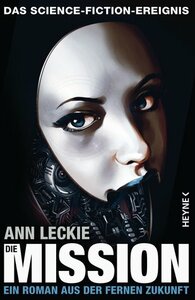Take a photo of a barcode or cover
Again, somehow didn't review this when I read it originally, so let's fix this now. :) Was thinking back as I was reading this book, and I think this is one of the first books I read where lesbian relationships were treated as a matter of fact, and to point out the weirdness of gender perceptions within society. We also get more of the politics of who is and isn't considered "people" within the confines of empire, especially in a relatively small plot point that ends up taking unexpected importance. While there's a lot going on in this book in terms of the larger plot, it also isn't afraid to let what might've been a side plot in another book take precedence for most of it. The varying scales of scope, the setup for the next book and continuance of plot points from the original book, and just all of this in general hit in just the right way. Still The Good Shit, almost a half decade plus on.
Spoiler
I really like the premise, characters, and style of the Ancillary series thus far, but found this book a little shallow. The major plotline from Ancillary Justice, the division of Anaander Minaai's personality into warring factions, is largely tabled as Breq addresses problems on the much smaller scope of a single planet. Unfortunately, the conflict that Breq encounters is cookie-cutter social injustice in the form of a feudal system of conquerors oppressing the conquered, and Breq's responses are similarly bland. The central conflict of Breq's exemplar morality versus Raughd's depraved selfishness plays out with little inspiration: Raughd commits incrementally more immoral crimes, until Breq intervenes with her power as Fleet Commander. As another reviewer put it, the story feels like a drawing by an artist who only got the primary color crayon box. The connection to the larger scope of the galactic conflict is tenuous, with Breq picking up a few clues on the planet which drive the sudden spate of action that concludes the novel.It's easy to be disappointed by the reduction in scope from Justice to Sword: from the collapse of an empire to the conflict between conquerors and conquered on a single planet. Nonetheless, of course, many a great novel has been set on a single planet. The turn-off for me was the lack of nuance in presentation.
adventurous
mysterious
medium-paced
Plot or Character Driven:
A mix
Strong character development:
Yes
Loveable characters:
Yes
Diverse cast of characters:
Yes
Flaws of characters a main focus:
Yes
A satisfactory follow up:
Continuing where volume 1 left, in more or less the same style but this time without flash-backs to cover the back story.
In this volume the emphasis is on the personal development of our main character and her struggle to be "only" one person without the collective and an AI behind her all the time.
The overall story arch do not evolve particulary in this volume but a lot of background information fall into place and the scene are nicely set for the conclusion, which i will be listening to next week.
Continuing where volume 1 left, in more or less the same style but this time without flash-backs to cover the back story.
In this volume the emphasis is on the personal development of our main character and her struggle to be "only" one person without the collective and an AI behind her all the time.
The overall story arch do not evolve particulary in this volume but a lot of background information fall into place and the scene are nicely set for the conclusion, which i will be listening to next week.
Some of the best science fiction I've read in years. Very highly recommended.
I think I liked this one better than the first in the trilogy.
I think, if anything, I might have liked this one _better_ than the first. Certainly, as much as. It focussed more on character and less on action. I appreciated the way the relationships were developed, and the way Breq is finding his/her way into his/her role and position in the society. The voice is humane and rational and very sympathetic. I want to read more and to know more about Breq and her society and how things are going to work out. My only quibble is that perhaps the gender non-specificity has become a bit old - don't you think that after this time Breq might have started to sort out markers and figure things out for him/herself? It felt just a bit gimmicky, when the rest of the world and characters were so far from being unreal. But overall this was an engrossing and enjoyable read.
I felt like the audiobook narrator really added a lot to this story, not least of which was proper pronunciation of names. She was fantastic.
The story itself is definitely a mid-series bridge plot, but it kept me interested and I look forward to completing the series.
The story itself is definitely a mid-series bridge plot, but it kept me interested and I look forward to completing the series.
The Radch trilogy continues. This time, rather than exploring a slew of planets and realities, Leckie has taken the opposite approach and digs deeply into a single planet. Mostly, I thought this worked -- the take on different cultures and dominant cultural identities is done well and carries over from the first book. There is maybe a bit too close some parallels to Earth cultural identities, but I think that helps ground the storyline for the reader.
I would say there's a critical point...maybe like the third quarter of the book...where the world starts to feel too small. There is a key event that forces something akin to isolation, and this isolation feels exceptionally long and tedious. It serves a purpose to some degree, but I simply found it long and kind of a dull part of the arc.
The cultural elements of the story are clearly its high points, and I thought it was interesting to see different forms of diplomatic leverage being explored. It was a fun little take on internal power building, and felt mostly well baked, though there were a couple points where I think you need to not think so hard about it, so again it's not quite the totally "hard" sci-fi genre, but instead pulls on enough of it to make the world feel real and genuine while crafting a nice story.
Not as successful as the first, for my tastes, but smartly not trying to copy it, I thought this was a nice build-up that added to the universe and introduces another character right from the get-go whose development is well done and, again, adds a cool extra layer of exploring the universe's rules.
I would say there's a critical point...maybe like the third quarter of the book...where the world starts to feel too small. There is a key event that forces something akin to isolation, and this isolation feels exceptionally long and tedious. It serves a purpose to some degree, but I simply found it long and kind of a dull part of the arc.
The cultural elements of the story are clearly its high points, and I thought it was interesting to see different forms of diplomatic leverage being explored. It was a fun little take on internal power building, and felt mostly well baked, though there were a couple points where I think you need to not think so hard about it, so again it's not quite the totally "hard" sci-fi genre, but instead pulls on enough of it to make the world feel real and genuine while crafting a nice story.
Not as successful as the first, for my tastes, but smartly not trying to copy it, I thought this was a nice build-up that added to the universe and introduces another character right from the get-go whose development is well done and, again, adds a cool extra layer of exploring the universe's rules.





